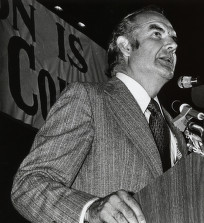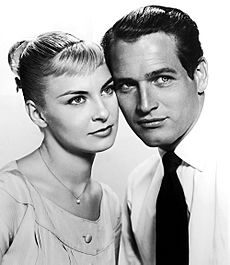Malibu Mafia facts for kids
The "Malibu Mafia" was a nickname for a group of wealthy American Jewish men. They gave money to support liberal and progressive ideas and politicians. This happened from the 1960s to the 1990s.
The group was linked to the beach city of Malibu, California. Key members included economist Stanley Sheinbaum, Warner Bros. chairman Ted Ashley, TV producer Norman Lear, and businessmen Harold Willens, Leopold Wyler, Miles L. Rubin, and Max Palevsky.
They started because they were against the Vietnam War. They often met at Willens' house on Malibu Colony Road. They also met at Sheinbaum's home in Westwood, Los Angeles, where he hosted regular political discussions. Many people from the film and TV industries joined these talks.
The Malibu Mafia was known for helping to fund:
- The 1972 presidential campaign of George McGovern, which didn't win.
- The legal defense of Daniel Ellsberg, who revealed the Pentagon Papers.
- The successful campaign of Tom Bradley to become the first African-American mayor of Los Angeles in 1973.
- Saving the progressive magazine The Nation in 1978.
- The Nuclear Freeze campaign in the 1980s, which aimed to stop the spread of nuclear weapons.
- The Israel–Palestine peace talks that led to the Oslo Accords in 1993.
The media first used the name "Malibu Mafia" in Newsweek magazine in 1978. The men themselves did not choose this name. Actors Paul Newman and Warren Beatty, and singer Barbra Streisand, were also sometimes linked to the group.
The group didn't always work together perfectly. They often acted on their own. The Malibu Mafia was seen as more liberal and idealistic compared to another Jewish political donor, Lew Wasserman. He was the chairman of MCA and had more moderate views. Later, in the 1980s, Streisand joined with Jane Fonda and other women to create the Hollywood Women's Political Committee. This group also funded many liberal causes.
Contents
- Key Causes Supported by the Malibu Mafia
- Helping Daniel Ellsberg's Legal Defense
- Supporting George McGovern for President
- Backing Tom Bradley for Mayor
- Challenging Big Oil Companies
- Helping The Nation Magazine
- The 1980 Presidential Election
- Founding People for the American Way
- Pushing for a Nuclear Weapons Freeze
- Supporting Israel–Palestine Peace Talks
- Members of the Malibu Mafia
Key Causes Supported by the Malibu Mafia
Helping Daniel Ellsberg's Legal Defense
Daniel Ellsberg was an activist who released the Pentagon Papers. These papers showed that the U.S. government had lied about how much the Vietnam War was growing. Ellsberg was put on trial and faced a very long prison sentence.
Activist "Ping" Ferry asked Stanley Sheinbaum to help raise money for Ellsberg's legal defense. Sheinbaum gave Ellsberg $900,000 over two years. The defense cost a lot of money each month. To help raise funds, Barbra Streisand even gave a private concert. She raised over $50,000 by singing songs requested for $1,000 to $3,000 each.
Supporting George McGovern for President

In early 1972, Senator George McGovern's presidential campaign ran out of money. Max Palevsky gave $319,000 to help. Miles Rubin also gave $150,000, which was his first political donation. Later, new laws about campaign funding stopped such large individual donations.
Backing Tom Bradley for Mayor
In 1973, the group supported Tom Bradley in his second try to become mayor of Los Angeles. Bradley had almost won in 1969. But the current mayor, Sam Yorty, won that time. Yorty was often busy trying to get higher political jobs. So, Palevsky decided to support Bradley again. Palevsky led a finance committee that gave the most money to Bradley's campaign. Bradley won and became the first African-American mayor of a major U.S. city.
Challenging Big Oil Companies
In 1975, five members of the Malibu Mafia met in Malibu. They talked about problems caused by large oil companies, often called "Big Oil". They decided to fight for more public control over U.S. energy policy. They formed the Energy Action Committee (EAC) and started it with $500,000. In 1976, Paul Newman and his wife Joanne Woodward spoke for the EAC in Washington D.C. The EAC wanted to stop natural gas prices from being uncontrolled. They also wanted to pass laws to break up big oil companies into separate parts for producing, refining, and selling oil.
Helping The Nation Magazine
In 1978, Stanley Sheinbaum and Norman Lear led the Malibu Mafia in helping The Nation magazine. This progressive magazine was struggling financially. Each donor promised $5,000 every year to keep the magazine in print, even though it often lost money.
The 1980 Presidential Election
Before the 1980 U.S. presidential election, most of the Malibu Mafia did not want President Jimmy Carter to be re-elected. They formed a group called "Democrats for Change." At first, they preferred Ted Kennedy as the Democratic candidate. In 1980, when Republican John B. Anderson decided to run as an independent, the group supported him. He strongly supported the Equal Rights Amendment. Norman Lear was a big supporter of Anderson. However, Max Palevsky liked Carter and was not part of this effort.
Founding People for the American Way
Norman Lear started the group People for the American Way in 1980. Its goal was to oppose certain conservative religious political groups. One of their successes was in 1987. They helped stop Robert Bork from becoming a Supreme Court Justice under President Reagan. Stanley Sheinbaum supported Lear in this effort.
Pushing for a Nuclear Weapons Freeze
In 1981, Harold Willens encouraged his friends to fund a movement to stop the spread of nuclear weapons. This movement was called the "bilateral nuclear freeze." It aimed to stop both the United States and the Soviet Union from making more nuclear weapons.
In 1982, Willens' group, "Californians for a Bilateral Nuclear Weapons Freeze," put a nuclear freeze idea on the ballot for California voters. The idea was not to reduce or get rid of nuclear weapons. Instead, it suggested stopping any further expansion. California would ask the federal government to "immediately halt the testing, production and further deployment of all nuclear weapons, missiles and delivery systems." This would be done in a way that both sides could check. Paul Newman helped get attention by announcing his support. Willens spoke to Congress about the nuclear freeze. Most of the $1.8 million spent on the campaign came from Willens. California voters approved the idea in November 1982. This meant the state governor should ask the federal government for a nuclear freeze.
Willens even met with President Ronald Reagan through his friendship with Reagan's daughter, Patti. At the White House, Reagan did not agree. He told Willens that the Soviets were ahead in the nuclear arms race. He felt the U.S. should catch up before a freeze could be considered. Willens argued that the U.S. already had enough weapons to destroy the Soviets many times over, but Reagan was not convinced.
Supporting Israel–Palestine Peace Talks
Stanley Sheinbaum strongly believed that peace between Israel and Palestine could only happen if Israel gave up some land and allowed Palestine to govern itself. This idea is called a two-state solution.
In 1987, the Swedish Foreign Minister, Sten Andersson, spoke to Israeli representatives about a possible peace plan. He thought the Palestine Liberation Organization (PLO) should discuss this idea with American Jews before talking directly with Israel. Andersson contacted Sheinbaum. Sheinbaum then gathered three other American Jews to meet with four high-ranking PLO officials in Sweden in November 1988.
After talking with Colin Powell, Sheinbaum and five colleagues met directly with Yasser Arafat, the Chairman of the PLO, in December in Sweden. They wanted to understand his views on peace and if he would promise to stop supporting terrorism. Arafat gave a positive response. He then spoke to the United Nations later that December. This meeting started a series of talks between Israel and Palestine. These talks eventually led to the Oslo Accords in 1993, which were important peace agreements.
Members of the Malibu Mafia
- Stanley Sheinbaum taught economics at Stanford University and Michigan State University. He married Betty Warner, whose family owned Warner Bros., in 1964. He helped free the Greek leader Andreas Papandreou from prison in 1967. He was very good at investing money. He also hosted political discussions at his home. He was a chairman for the Southern California chapter of the American Civil Liberties Union. As a Regent of the University of California, he pushed for the university to stop investing in South Africa because of its racist apartheid practices.
- Ted Ashley became the head of Warner Bros. in 1970. He helped the company become profitable again with the film Woodstock. Ashley didn't support McGovern's 1972 presidential campaign. Instead, he donated money to Nixon.
- Norman Lear started writing for television in the 1950s. He began producing TV shows, and by the late 1960s, he also produced several films. He became very successful with the TV series All in the Family in 1971 and Sanford and Son in 1972. After working with the Malibu Mafia to support Democratic Party candidates, Lear became less involved in politics after 1992.
- Max Palevsky designed computer parts in the 1950s. He founded Scientific Data Systems in 1961. Xerox bought his company in 1969, giving Palevsky $100 million. He then invested in Intel. His first big political donation was to McGovern in 1972. In the 1970s, Palevsky helped start the Museum of Contemporary Art, Los Angeles. He also helped fund a short-lived journal called democracy in 1980. Palevsky raised money in 2007 to help Barack Obama in the 2008 U.S. presidential election.
- Harold Willens was born in Ukraine. He escaped danger during the Kiev pogroms (1919) and moved to the U.S. when he was eight years old in 1922. He served in the U.S. Marines during the Pacific War. He was deeply affected by seeing the destruction from the atomic bombings of Hiroshima and Nagasaki. He became wealthy from real estate. His two-story home on Malibu Beach was used for the Malibu Mafia's meetings. In 1968, he started the Businessmen's Educational Fund. This group aimed to reduce the influence of the defense industry on government and stop the nuclear arms race. Willens later came up with the idea for the Nuclear Freeze movement and helped fund it. Willens was a Jewish atheist.
- Leopold "Leo" Wyler was the head of Tool Research and Engineering Corporation. This company made missile parts for the defense industry. In 1973, he partnered with Frank Jameson to form J-W Corporation for international trading.
- Miles L. Rubin funded the creation of a fuel cell for cars in the early 1970s, but it didn't work out as planned. He started Reliance Manufacturing, which made parachutes and ejection seats for the U.S. military. He also founded the company Polo Ralph Lauren Jeanswear in 1990 and sold it for a profit in 1997. He formed another clothing company, Sun/Greater Texas, which sold for $150 million in 1997. In 2004, he formed Miles Electric Vehicles to help the environment. At Stanford Law School, Rubin created the Miles L. Rubin Public Interest Award. This award is given each year to a former student who uses law or advocacy to help the public.


